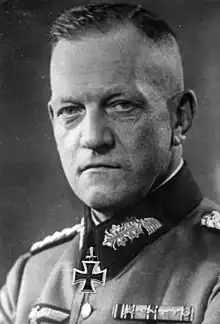Georg Lindemann | |
|---|---|
 | |
| Born | 8 March 1884 Osterburg, German Empire |
| Died | 25 September 1963 (aged 79) Freudenstadt, West Germany |
| Allegiance | |
| Service/ | Army (Wehrmacht) |
| Years of service | 1903–45 |
| Rank | |
| Commands held | 36th Infantry Division L Army Corps 18th Army Army Group North |
| Battles/wars | World War I World War II |
| Awards | Knight's Cross of the Iron Cross with Oak Leaves |
| Relations | Ernst Lindemann (cousin) |
Georg Lindemann (8 March 1884 – 25 September 1963) was a German general during World War II. He commanded the 18th Army during the Soviet Kingisepp–Gdov Offensive.
World War II
In 1936, Lindemann was promoted to Generalmajor and given command of the 36th Infantry Division which took part in the Invasion of France. Lindemann was promoted to full General and given command of the L Army Corps. In June 1941, at the launch of Operation Barbarossa, Lindemann's Corps was a part of Army Group North. Lindemann commanded the corps during the advance towards Leningrad. His unit was briefly shifted to the command of Army Group Centre during the Battle of Smolensk. Lindemann's corps was then shifted back to Army Group North.
On 16 January 1942, Lindemann took the command of the 18th Army, a part of Army Group North. In the summer of 1942, he was promoted to Generaloberst. Lindemann commanded the 18th Army throughout the campaigns around Leningrad and during the January 1944 retreat from the Oranienbaum Bridgehead to Narva. He was promoted to command of Army Group North on 31 March 1944. On 4 July 1944, he was relieved and transferred to the Reserve Army. On 1 February 1945, he was appointed to the command of all German troops in Denmark as the "Supreme Commander of the Armed Forces in Denmark". Germany surrendered unconditionally in northwest Germany, the Netherlands, and Denmark on 5 May 1945. Lindemann was then given the task of dismantling the German occupation of Denmark until 6 June 1945, when he was arrested at his headquarters in Silkeborg. He was held in American custody until 1948. Lindemann died in 1963 in Freudenstadt, West Germany.
Awards and decorations
- Iron Cross (1914) 2nd Class (9 September 1914) & 1st Class (28 July 1915)[1]
- Clasp to the Iron Cross (1939) 2nd Class (26 September 1939) & 1st Class (30 October 1939)[1]
- Knight's Cross of the Iron Cross with Oak Leaves
- Knight's Cross on 5 August 1940 as Generalleutnant and commander of the 36. Infantry-Division[2]
- Oak Leaves on 21 August 1943 as Generaloberst and commander of the 18.Armee[3]
- The soviet city of Gatschina near Leningrad was renamed after him in Lindemannstadt between 1942 and 1944.
References
Citations
Bibliography
- Fellgiebel, Walther-Peer (2000) [1986]. Die Träger des Ritterkreuzes des Eisernen Kreuzes 1939–1945 [The Bearers of the Knight's Cross of the Iron Cross 1939–1945] (in German). Friedberg, Germany: Podzun-Pallas. ISBN 978-3-7909-0284-6.
- Thomas, Franz (1998). Die Eichenlaubträger 1939–1945 Band 2: L–Z [The Oak Leaves Bearers 1939–1945 Volume 2: L–Z] (in German). Osnabrück, Germany: Biblio-Verlag. ISBN 978-3-7648-2300-9.